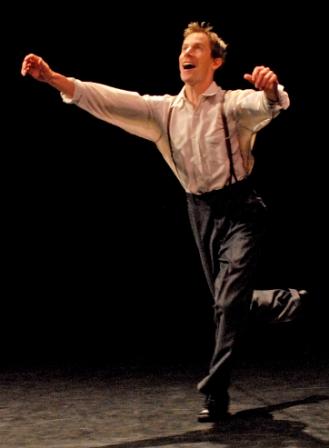The Invisible Life of Joseph Finch: the inevitable power of the holocaust

Although it was not presented as such, *The Invisible Life of Joseph Finch* is a holocaust story. On one level, it was an understandable decision to not define the work in this manner. Saying something is “about” the holocaust can’t help but set up a series of expectations in the minds of an audience.
By not highlighting the holocaust, perhaps it was hoped that it would allow the story of Joseph Finch to unfold without the looming atrocity at the forefront of the audience’s imagination. While this is an interesting approach it doesn’t, however, allow the work itself to escape from the impact of being about one of the biggest tragedies in living memory. The holocaust is such a massive event that it can’t help but overwhelm a work. It is also – in a strictly narrative sense – a story that is very familiar. Indeed, the final quarter of Joseph Finch takes its narrative structure from the historical sequence of events from Kristallnacht through to Auschwitz. I’m afraid it wasn’t clear to me how this final sequence fitted in with the first three-quarters, which detailed Finch’s childhood and early life.
Joseph Finch is written and directed by Serge Bennathan and was produced by his company, "Les Productions FIGLIO":http://www.lesproductionsfiglio.ca/ as part of this year’s "Chutzpah Festival":http://www.chutzpahfestival.com/. Bennathan is an acclaimed choreographer. However, Joseph Finch isn’t a dance piece but rather full-blown theatre: a one man show that features Jonathon Young. Rather surprisingly, for a piece created by a choreographer and featuring one of Vancouver’s most gifted physical actors, movement is not a major element of the work; although there were some lovely touches, including Young going on a bike trip while lying on his back. Another moment of subtle physical work takes place during the Auschwitz sequence, where Young methodically strips before being bathed in sculptured light. As with the rest of the piece, this moment looks gorgeous. The whole production evokes a minimalist aesthetic. The stage is bare with only a table, chair and sheaves of paper. At the top of the show, the papers are neatly piled high on the table and lit in a golden light. The table top can spin and Young sends the papers flying across the stage while directly above the table a large, rectangular lantern – the kind you might find in an upscale Sushi restaurant – glows.
In addition to being a choreographer, Bennathan is also a writer. Unfortunately, for me, the text was not as clear as it could have been. While theatre can explore the most complex of human issues, the language itself has to be clear otherwise the audience has trouble hearing it. And I don’t mean hearing the words – or in this case the abundant metaphors – but hearing the story and the voices of the characters. For me, poetry on stage – and Joseph Finch is a highly poetical text – often acts as a barrier. It stops an audience from accessing the characters in a meaningful way. I’m not saying that you can’t use poetry (I’ve attempted it myself) but the poetry has to be stripped down, simple and clear. As a lived text I had trouble hearing Joseph Finch and – as a consequence – had difficulty decoding both the narrative and the themes. I suspect that it is stronger as a read text – and this is something it shares with any number of contemporary play-texts.
This doesn’t mean that there weren’t strong moments, there were. Young is a magnetic presence and when he adopts the voices of other characters – particularly an uncle prone to inappropriate utterances and farts – the piece comes into a vitality that is often missing. This brings me back to my first point about the relationship of the story to the holocaust. The core of the piece seems to be about a father who has been separated from his daughter for decades. He is writing to her (hence all the paper). Yet this core idea does not feel as embedded within the work as it should be. If the story is about their separation caused by the holocaust, then that must take centre stage with the holocaust as a central motif. If it is rather about a man seeking out a daughter he doesn’t know, then it needs to focus more directly on that experience. Maybe I’m over- thinking this – but the placement of the holocaust and its role within the piece just seems out of step to me. Maybe a simpler story of loss would have been more affecting.
_The Invisible Life of Joseph Finch Starring Jonathon Young; Written and Directed by Serge Bennathan Presented by Chutzpah! and Vancouver 2010 Cultural Olympiad. Performances were on February 21 and 22, 2009 at the Norman Rothstein Theatre in Vancouver._



